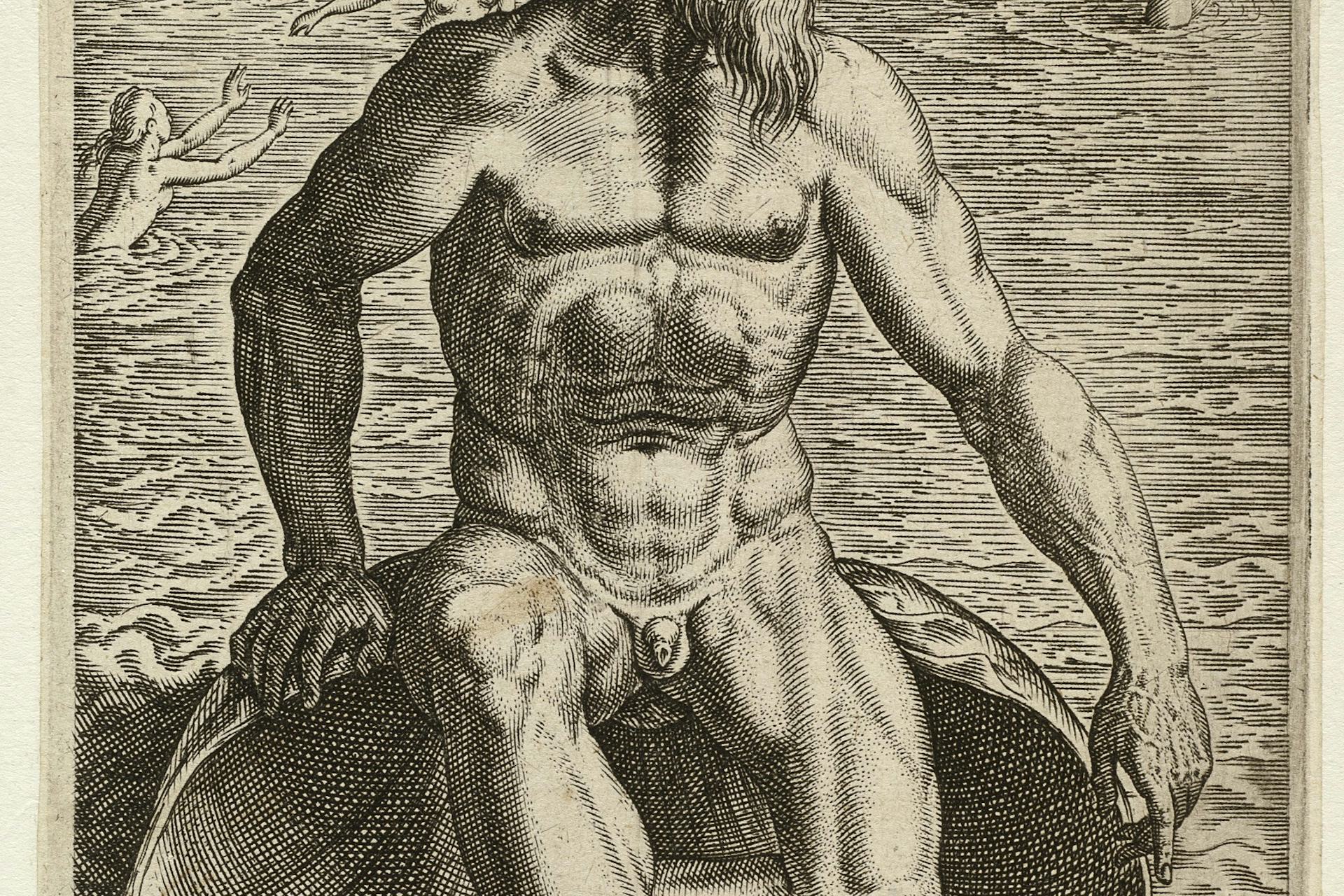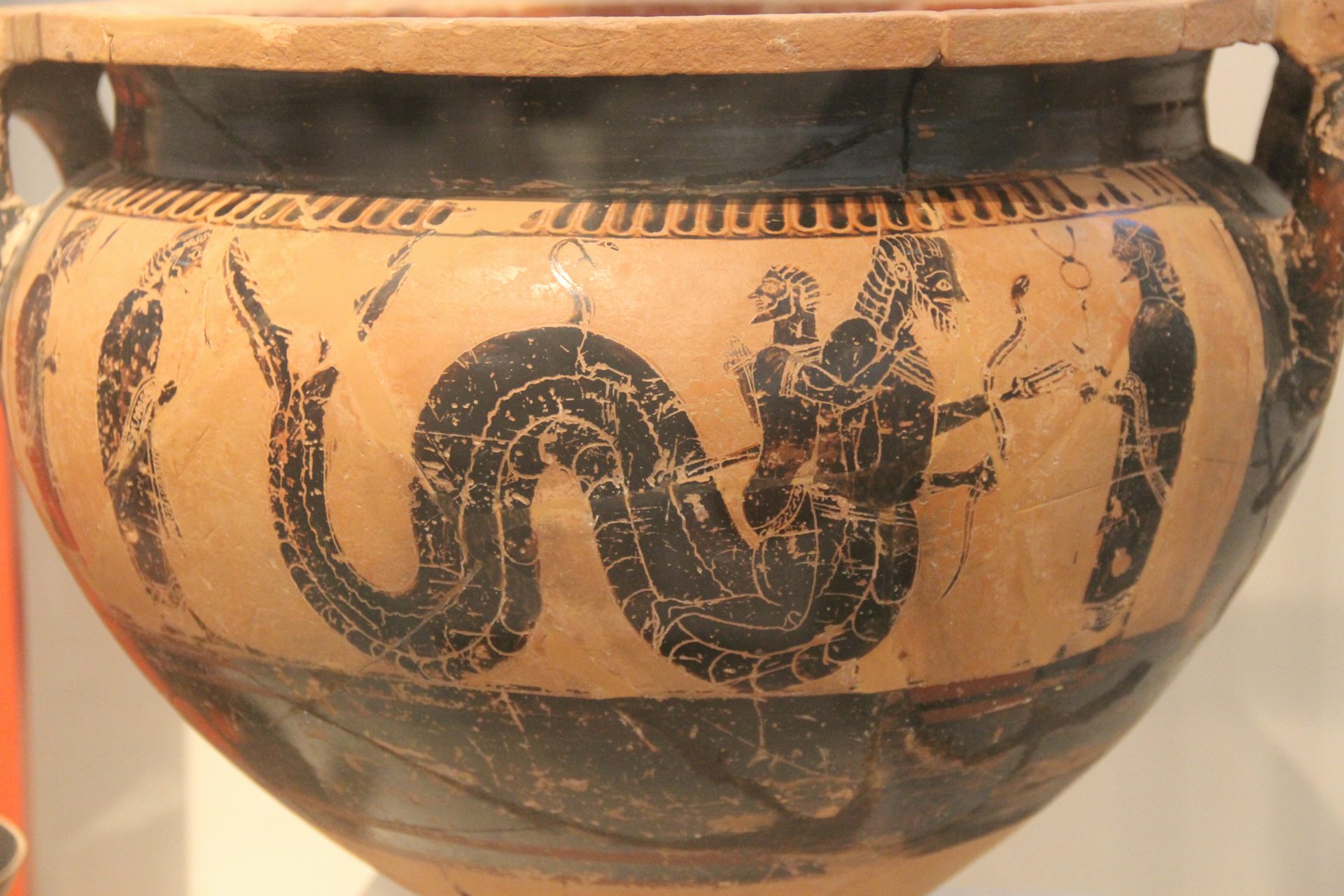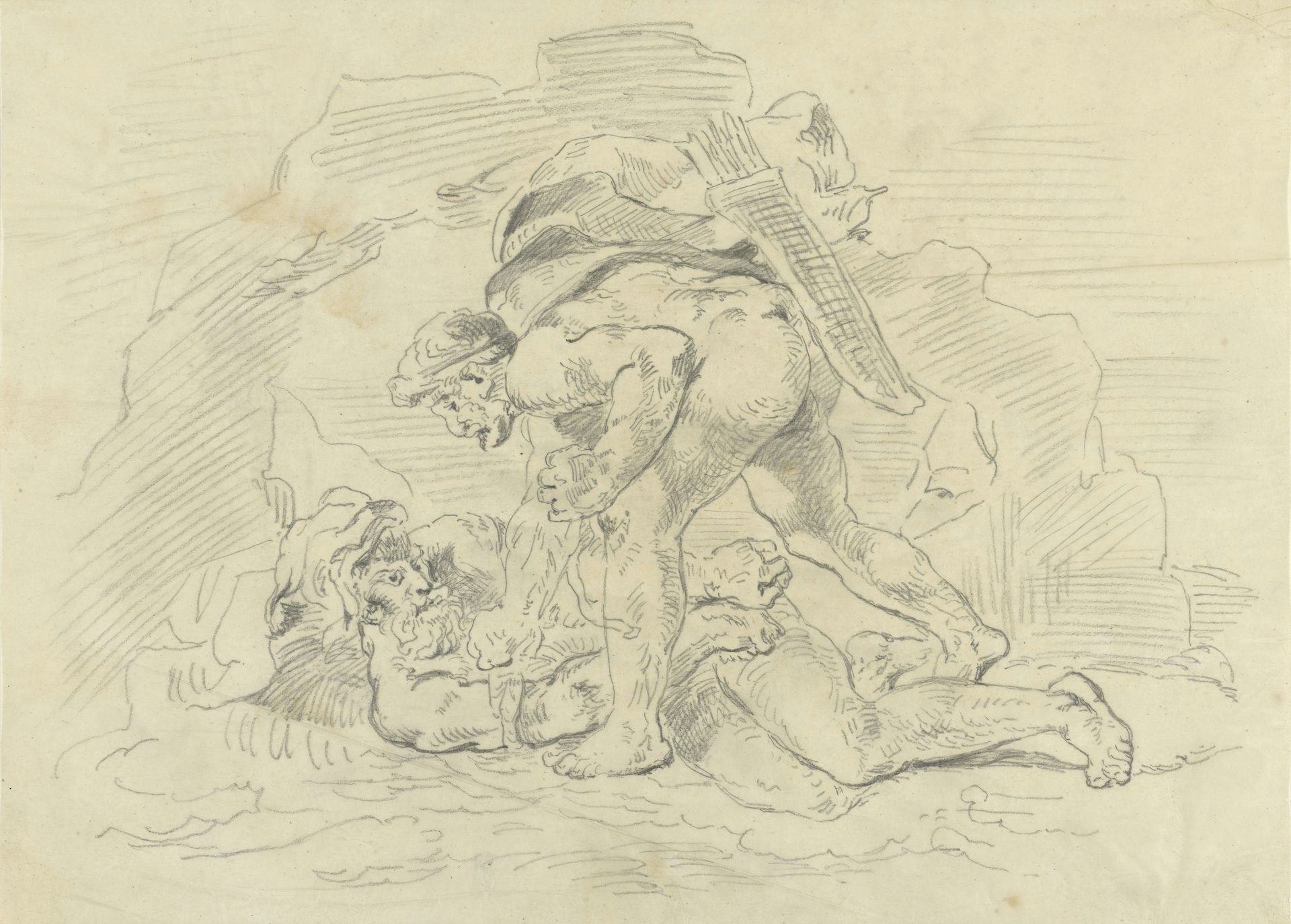Nereus

Illustration of Nereus by Philips Galle (1586).
North Holland ArchivesPublic DomainOverview
Nereus, the “Old Man of the Sea,” was a minor sea god. Nereus was the son of the primordial gods Pontus and Gaia. He lived deep beneath the waves with his wife Doris and his daughters, the fifty enchanting Nereids. Known for his gentleness and wisdom, Nereus possessed several important abilities, such as the gift of prophecy and the power to change his shape. Nereus had virtually no mythology or cult of his own, but in one story Heracles wrestled Nereus to make him reveal the way to the Garden of the Hesperides.
Etymology
The name “Nereus” (Greek Νηρεύς, translit. Nēreús), which is not necessarily older than the title “Nereid,” may be related to the obscure Greek words νῆρις (nêris, “hollow rock”) and νηρός (nērós, “low-lying”), but it is perhaps more likely to be of pre-Greek origin; Indo-European etymologies have been proposed but have not found widespread acceptance.[1]
Pronunciation
English
Greek
Nereus Νηρεύς (Nēreús) Phonetic
IPA
[NEER-ee-uhs] /ˈnɪər i əs/
Titles and Epithets
Nereus was one of the sea deities known as ἅλιος γέρων (hálios gérōn), “Old Man of the Sea” or simply γέρων (gérōn), “old man.”[2][3] This epithet reflected the high regard in which the Greeks held the elder sea gods, who were notable for their wisdom. Other sea gods, including Proteus and Phorcys, bore the same epithet.
Attributes
Functions and Characteristics
Nereus, an “Old Man of the Sea,” was a wise and benign marine deity. Hesiod described Nereus as honest, knowledgeable, gentle, and unerring, writing that he
is true and lies not: and men call him the Old Man because he is trusty and gentle and does not forget the laws of righteousness, but thinks just and kindly thoughts.[4]
Nereus, like other sea gods, possessed the gift of prophecy. He could also change shape, assuming new forms at will.[5] For the Orphics, Nereus was the eldest of all the sea deities.[6]
Nereus lived in a cave deep beneath the sea with his wife Doris and his daughters, the fifty Nereids.[7] In some accounts, it was in Nereus’ undersea home that the goddess Aphrodite was brought up.[8]
Though usually represented as gentle and benign, Nereus could also unleash the full fury of the deep when necessary. Virgil, for instance, refers to a trident-wielding Nereus stirring up wild storms at sea,[9] and Nonnus describes Nereus fighting with his trident.[10] The Orphics hailed Nereus as a terrible god of earthquakes (perhaps confusing him with Poseidon).[11]
Iconography
In ancient art, Nereus was characteristically depicted as an old man (he was one of the Old Men of the Sea, after all), with a beard and with a bald or balding head. In the earliest representations, he was always fish-tailed, similar to a merman; but from as early as the mid-sixth century BCE Nereus was sometimes fully human in form. He was often shown wearing a flowing tunic over his human torso and sometimes carried a staff or scepter. In some depictions, he could be seen riding a hippocamp, a fish-tailed horse.
The most recognizable scenes in which Nereus was depicted showed the sea god’s battle with Heracles. But Nereus also showed up in other mythical scenes, for instance in the stories of his daughter Thetis, alongside the Olympian sea god Poseidon, or fighting in the Gigantomachy. He is rare in Greek art after the Classical Period (ca. 490–323 BCE).[12]

Attic black-figure column krater showing Heracles fighting Nereus, attributed to Sophilos (ca. 580 BCE). National Archaeological Museum, Athens, Greece.
Wikimedia CommonsPublic DomainFamily
According to Hesiod’s Theogony, Nereus was the eldest child of Gaia, the primordial embodiment of the earth, and of Gaia’s son Pontus, the embodiment of the sea. His siblings were Phorcys, Thaumas, Eurybia, and Ceto.[13] In an Orphic tradition, however, Nereus is one of the Titans, born to Gaia and Uranus (“Sky”) rather than Gaia and Pontus,[14] and there were also sources that made Nereus the father of Pontus[15] or even the brother of Zeus and Poseidon.[16]
Nereus married Doris, one of the three thousand Oceanids. Their children were the fifty Nereids, beautiful goddesses of the sea named after their father Nereus.[17] Thetis, the most important of the Nereids, was the mother of Achilles, the greatest hero of the Trojan War. According to one late account, they also had a son named Nerites, a handsome lover of Aphrodite or Poseidon who was transformed into a spiral shellfish.[18]
Mythology
Origins
The figure of Nereus has been compared to the “Master of Animals,” a deity or hero who functions as a protector of all animals or of a single species of animals: indeed, the Greeks thought of Nereus as a ruler of the sea and the creatures that lived in the sea, and sometimes represented Nereus himself with fish attributes.[19] Other attributes—Nereus’ gentleness, wisdom, and prophetic ability—are more distinctively Greek, linking Nereus to similar deities such as Proteus and Phorcys.
In Greek mythology, Nereus was born when the cosmos was still young. His mother Gaia was one of the first beings to come into existence, while his father Pontus was one of Gaia’s first children. Nereus and his siblings were among the earliest gods of the sea. Nereus himself wed Doris and together the couple peopled the wave with their own children, the fifty Nereids.
Nereus and Heracles
Nereus only really plays a key role in one myth. In a tradition known from literary as well as artistic sources, Heracles sought instructions from the wise Nereus while en route to one of his Twelve Labors (in what seems to have been the standard account, Heracles wished to learn how to reach the Garden of the Hesperides). When Nereus refused to give Heracles the information he sought, the hero set out to force the information out of him. Nereus tried to escape Heracles’ grip by changing shape, turning himself into water and even fire. But Heracles held on. Nereus finally relented and told Heracles what he wanted to know.[20]

Hercules Fighting Nereus by Eugène Delacroix (1849).
RijksmuseumPublic DomainIn at least one account, Nereus also helped Heracles with another one of his labors. When Heracles needed to travel across the ocean to steal the cattle of Geryon (his tenth labor), Nereus gave him the cup of Helios to make the voyage.[21]
Worship
The Nereids, Nereus’ daughters, were worshiped extensively throughout the Greek world.[22] But there is relatively little evidence for a cult of Nereus. However, one source does mention a shared temple of Nereus and the Nereids,[23] and Pausanias believed that the “Old Man” worshiped in the Laconian town of Gythium was none other than Nereus.[24]